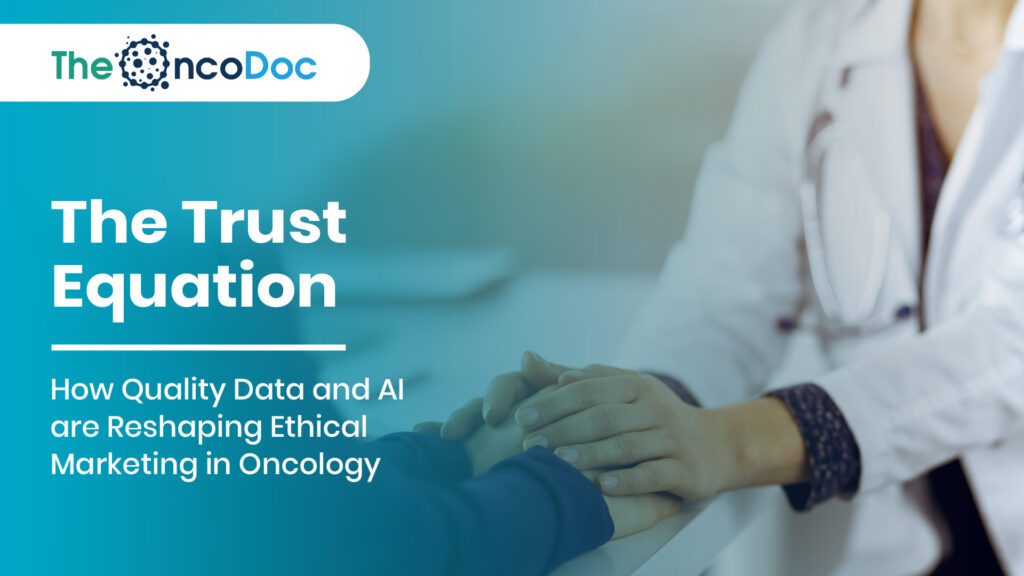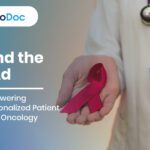Introduction: Trust as the Cornerstone of Oncology Marketing
Oncology marketing has always carried a unique moral responsibility. Unlike other therapeutic areas, cancer care touches the most vulnerable aspects of human life, fear, hope, and survival. In 2025 and beyond, success for pharmaceutical marketers is no longer measured by prescription numbers but by the ability to build trust and deliver ethical value to patients, caregivers, and healthcare professionals.
In oncology, the trust equation is increasingly influenced by two factors:
- Quality data that ensures transparency, accuracy, and fairness.
- Artificial Intelligence (AI) that enables personalization, prediction, and ethical scalability.
This article explores how pharma marketers are leveraging these forces to reshape ethical oncology marketing, highlighting practical strategies, ethical considerations, and transformative trends.
1. The Evolution from Promotion to Trust-Building
- Traditional oncology marketing revolved around pushing treatment benefits.
- The new paradigm focuses on patient-first engagement where credibility, transparency, and empathy drive decision-making.
- Quality data ensures that campaigns are based on facts, not exaggerations.
- AI helps identify not just what patients need but also how to deliver it responsibly.
Key Insight: Trust is no longer a byproduct; it is the primary outcome marketers must design for.
2. Defining the Trust Equation in Oncology
The trust equation combines three variables:
- Transparency (T): Honest communication about drug efficacy, side effects, and affordability.
- Relevance (R): Making sure the appropriate information is delivered at the appropriate moment to the appropriate audience.
- Ethical Use of AI (E): Deploying predictive and personalization technologies responsibly, without manipulation.
Trust (TR) can be expressed as:
TR = (T + R + E) ÷ Perceived Risk
The lower the perceived risk (misuse of data, biased marketing, or misinformation), the stronger the trust built.
3. The Role of Quality Data in Ethical Oncology Marketing
- Accurate diagnosis insights: Data from cancer registries, electronic health records, and genomic studies guide evidence-based campaigns.
- Bias-free messaging: By ensuring data integrity, marketers prevent overpromising or misleading claims.
- Data ethics: Patients are increasingly conscious about how their medical information is used. Transparency about data use fosters credibility.

4. AI as a Trust Amplifier
- Predictive AI pinpoints communities with elevated cancer risk and drives timely, targeted educational outreach to raise awareness and encourage preventive action.
- Personalized AI tailors awareness campaigns to individual preferences, literacy levels, and cultural backgrounds.
- Ethical AI ensures algorithms are audited to prevent biases against rural, low-income, or minority groups.
Example: Instead of bombarding all audiences with the same lung cancer awareness ad, AI narrows the message to smokers in high-risk geographies with local-language campaigns.
5. Transparency as a Non-Negotiable Standard
- Patients demand clarity on drug pricing, success rates, and side effects.
- Pharma marketers use AI-driven explainable dashboards to present trial data in simple formats.
- Visual infographics and survivor stories are combined with validated statistics to avoid misleading narratives.
Ethical Win: Campaigns should focus on providing informed hope rather than trying to sell it.
6. Patient-Centered Storytelling with Data Integrity
- Survivor stories remain the most powerful communication tool in oncology.
- However, pairing them with quality data points ensures authenticity.
- Example: A breast cancer survivor’s narrative is paired with verified trial outcomes for the therapy she used.
This hybrid of emotion + data resonates deeper, fostering both empathy and credibility.
7. Empowering General Practitioners (GPs) with Ethical AI Tools
- Early cancer signs are often difficult for general practitioners to recognize.
- Ethical pharma marketing provides AI-backed educational modules that help GPs refer patients sooner.
- Predictive notifications for local cancer risks, CME modules, and AI chatbots based on WhatsApp are examples of tools.

8. Hyperlocal and Vernacular Campaigns with AI Support
- Quality data identifies which cancers dominate in specific geographies.
- AI translates content into vernacular campaigns for maximum impact.
- Example: Oral cancer awareness in Uttar Pradesh via Bhojpuri videos; breast cancer messaging in Tamil Nadu through Tamil infographics.
Result: Patients feel seen, understood, and respected, which enhances trust.
9. Ethical Personalization vs. Manipulation
- Personalization becomes manipulation if it pressures patients into unnecessary treatments.
- Ethical personalization balances useful nudges (screening reminders, awareness content) without emotional coercion.
- AI transparency ensures users know why they are seeing a particular message.
10. Building Ethical Digital Tools for Oncologists
Oncologists today need more than promotional content, they require reliable, evidence-based support to make timely clinical decisions. Pharma companies are stepping into the role of trusted knowledge partners by creating ethical digital solutions.
- AI-powered dashboards provide concise trial summaries, updated treatment protocols, and patient adherence insights in real time.
- Decision-support systems integrate clinical guidelines with patient-specific data to improve outcomes.
- Adherence trackers and monitoring tools help doctors manage long-term therapies more effectively.
- Transparent, ethical design ensures these platforms remain unbiased, prioritizing education over promotion.
Such tools not only strengthen oncologists’ confidence but also build long-term trust between the medical community and the pharma industry.
11. Measuring Ethical Impact: Beyond Vanity Metrics
- Clicks and impressions don’t reflect ethical impact.
- Quality KPIs include:
- Number of screenings initiated.
- Patient trust scores.
- GP referral improvements.
- Community sentiment analysis.

12. AI for Predictive and Preventive Campaigns
AI is reshaping how oncology awareness and prevention campaigns are designed by moving from reactive outreach to proactive education. By analyzing real-time digital footprints and healthcare interactions, AI can identify patterns that signal potential cancer concerns early.
• It monitors clinic visits, online health queries, and social media discussions to spot emerging surges.
• Instead of using fear-based tactics, ethical campaigns deliver accurate, timely, and empathetic educational content.
• For instance, if search interest in “persistent cough” rises, AI triggers targeted messages encouraging lung health check-ups and screenings, without creating unnecessary alarm.
This approach ensures campaigns are not only predictive but also preventive, empowering communities with trustworthy guidance before risks escalate.
13. Countering Misinformation through Ethical Social Listening
- AI-powered social listening detects harmful myths (“herbal cures for cancer”).
- Ethical campaigns counteract with fact-checked, doctor-led content.
- Speed and empathy are critical to avoid panic or mistrust.
14. Emotional Sentiment Analysis for Continuous Trust Monitoring
Trust is central to oncology communication, and AI now plays a vital role in measuring and sustaining it. By analyzing emotions expressed across patient forums, social media, and feedback channels, pharma companies can adapt campaigns in real time.
• AI tools detect emotional tones such as optimism, anxiety, or confusion within patient conversations.
• Campaigns are then fine-tuned to reinforce empathy, provide reassurance, and avoid triggering fear.
• For instance, if patient feedback reflects heightened worry, communication pivots toward inspiring survivor journeys or expert reassurance.
This dynamic monitoring ensures that outreach remains patient-centered, empathetic, and trustworthy, strengthening long-term connections between the oncology community and patients.
15. Gamification with Responsibility
- Screening challenges and health quizzes drive engagement.
- Ethical gamification avoids trivializing cancer, it balances fun with serious health outcomes.
- Example: Achievement badges for attending a screening camp that highlight community contribution, not just competition.
16. Wearables and Digital Health for Ethical Nudging
AI-powered wearables are becoming proactive partners in preventive oncology by turning everyday health data into meaningful insights. With continuous tracking of vital metrics, they can gently guide individuals toward timely medical attention.
• Data from sleep patterns, heart rate, or body weight is analyzed to recommend relevant health screenings.
• Ethical safeguards such as informed consent and strict data privacy are crucial to protect user trust.
• For example, if a fitness band notices unexplained weight loss, it triggers a neutral awareness alert encouraging a general health check-up, rather than issuing a direct cancer warning.
This balance between technology and ethics makes digital nudging a powerful tool for early awareness without instilling unnecessary fear.
17. Virtual Communities Anchored in Empathy
- Ethical pharma marketing builds safe digital communities for patients, survivors, and caregivers.
- Peer conversations, webinars, emotional counseling, and myth-busting seminars are among the activities.
- These communities become organic trust hubs where pharma is seen as a supporter, not a seller.
18. Voice Search and Accessibility
AI is making cancer information more inclusive by breaking barriers of literacy and language. With voice-driven technologies, even underserved populations can access reliable health insights in a format they understand.
• AI-powered IVR systems and voice assistants answer cancer-related questions in local languages, offering clarity to people with limited reading ability.
• For example, a Hindi-speaking villager may simply ask, “kya lung cancer ke lakshan kya hain?” and instantly receive accurate, easy-to-follow audio guidance.
• By simplifying access to knowledge, these tools reduce misinformation and empower rural or low-literacy groups.
Such innovations close the communication gap and foster trust, ensuring that cancer education reaches every segment of society.
19. Collaborations with Ethical Partners
- NGOs, governments, and local survivor clubs amplify ethical oncology campaigns.
- Partnerships ensure pharma marketing aligns with public health missions.
- Trust grows when communities see pharma working with, not over, them.
20. Data Privacy and Consent as a Trust Multiplier
- In oncology, data is deeply personal, genetic profiles, treatment histories, and survivorship outcomes.
- Patients often hesitate to share sensitive data if they fear misuse.
- Ethical pharma marketing ensures clear consent mechanisms, explaining:
- What data is collected.
- Why it is needed.
- How it benefits the patient community.
- Example: A clinical trial recruitment campaign that transparently shows how patient data helps discover more precise therapies builds far greater trust than one that conceals data usage.
Ethical Edge: When patients feel ownership over their data, they become advocates for the brand.
21. Cultural Sensitivity in AI-Driven Campaigns
- Cancer carries strong cultural stigmas in many regions.
- Ethical oncology marketing powered by AI ensures campaigns respect cultural values while encouraging awareness.
- Example: In conservative communities, breast cancer campaigns use female community leaders and survivor advocates instead of generic ads.
- AI tools help detect local sensitivities and adapt content, whether that means tone, imagery, or platform choice.
Result: Campaigns resonate authentically, avoiding unintended offense or alienation.
22. Ethical Pricing Communication and Access Support
- Beyond awareness, patients trust brands that acknowledge affordability concerns.
- Ethical oncology marketing includes:
- Transparent drug pricing communication.
- Information on insurance schemes.
- Guidance on NGO or government subsidy programs.
- Example: AI-powered patient portals that recommend financial assistance options alongside treatment education.
Key Impact: Patients perceive the brand as empathetic, not opportunistic.
23. Emotional AI for Humanized Campaigns
- Emotional AI analyzes tone, language, and patient interaction patterns to guide campaigns.
- Example: Instead of urging additional diagnostics, a chatbot that recognizes distress in patient answers changes the tone to one of reassurance.
- This ensures patients feel heard and supported, not overwhelmed.
Ethical Safeguard: Emotional AI is designed with boundaries, avoiding manipulation or exploiting fear. Instead, it focuses on empathy.
24. Long-Term Survivor Engagement as a Trust Strategy
- Oncology trust is not built only during treatment, it must extend into survivorship.
- Pharma marketers can build long-term relationships through:
- Nutrition and lifestyle apps for survivors.
- Support groups for mental health and recurrence anxiety.
- Continued education about new therapies.
- Example: A leukemia survivor community supported by pharma offering 5-year post-treatment support tools.
Outcome: Survivors evolve into brand advocates, strengthening community trust.
25. The Future of Ethical Oncology Marketing (Reframed)
- The next decade will see oncology marketing evolve into a trust-first ecosystem where:
- AI-driven predictive tools anticipate community risks without fearmongering.
- Data integrity frameworks ensure no bias or misuse creeps into campaigns.
- Empathy and ethics define every touchpoint, from awareness to survivorship.
- Cancer marketing will not be about influencing choice, but about enabling informed, confident, and compassionate decisions.
Conclusion
The nexus of data, AI ethics, and trust is where cancer marketing is headed. By prioritizing transparency, cultural sensitivity, and survivor-centered engagement, pharma companies can redefine their role from promoters to trusted partners in care. Campaigns that respect patient autonomy while leveraging AI for personalization will lead the way. Ultimately, ethical oncology marketing is not about transactions but about transforming lives, ensuring patients, caregivers, and healthcare providers feel supported, respected, and empowered at every stage of the cancer journey.
The Oncodoc team is a group of passionate healthcare and marketing professionals dedicated to delivering accurate, engaging, and impactful content. With expertise across medical research, digital strategy, and clinical communication, the team focuses on empowering healthcare professionals and patients alike. Through evidence-based insights and innovative storytelling, Hidoc aims to bridge the gap between medicine and digital engagement, promoting wellness and informed decision-making.



